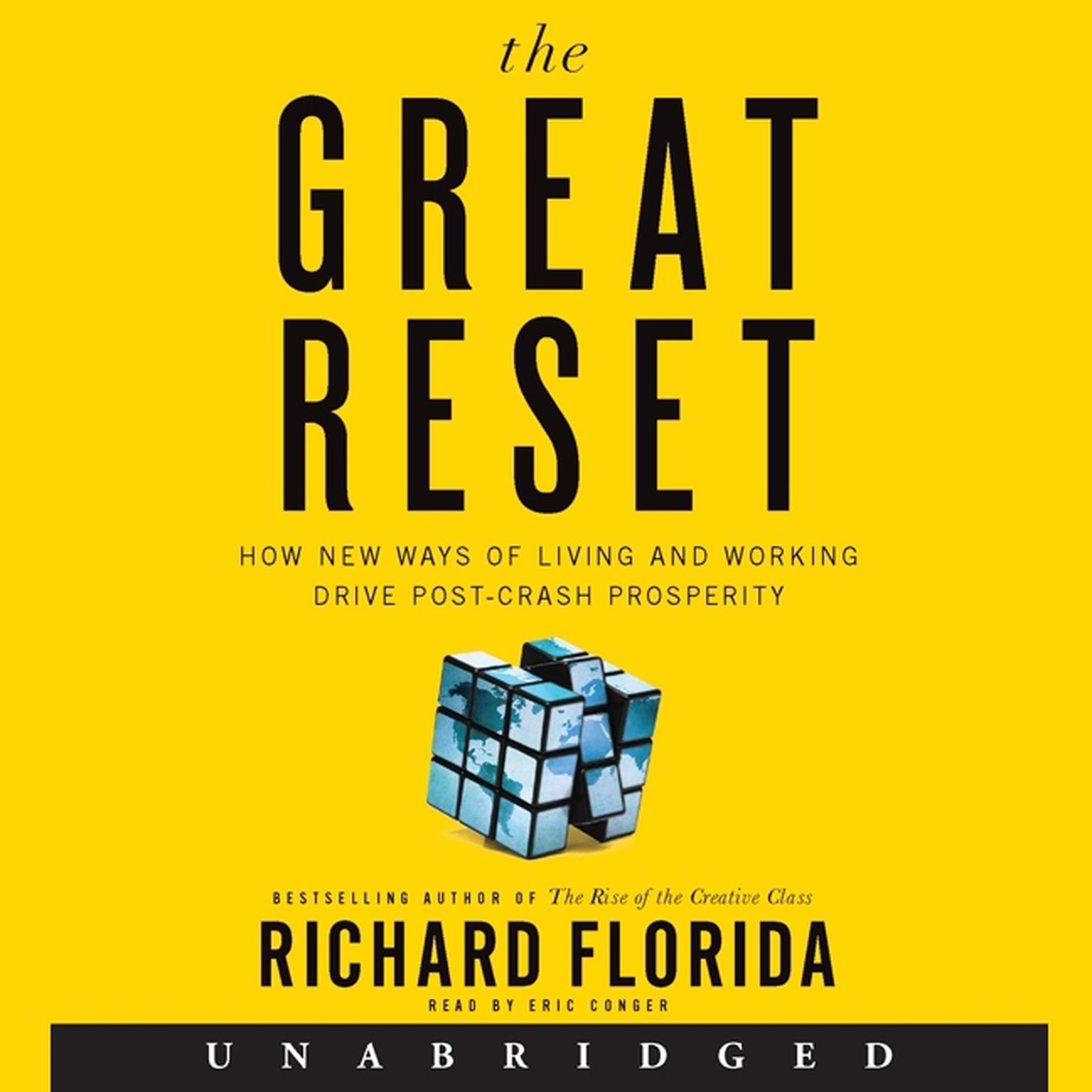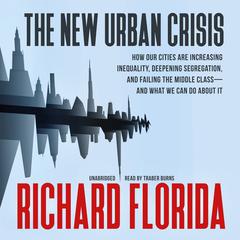 Play Audiobook Sample
Play Audiobook Sample
The Great Reset: How New Ways of Living and Working Drive Post-Crash Prosperity Audiobook
 Play Audiobook Sample
Play Audiobook Sample
This audiobook is no longer available through the publisher and we don't know if or when it will become available again. Please check out similar audiobooks below, and click the "Vote this up!" button to let us know you're interested in this title. This audiobook has 0 votes
Quick Stats About this Audiobook
Total Audiobook Chapters:
Longest Chapter Length:
Shortest Chapter Length:
Average Chapter Length:
Audiobooks by this Author:
Publisher Description
From Richard Florida, author of the bestselling books The Rise of the Creative Class and Who’s Your City?, comes a book that frames the economic meltdown of 2008–09 not as a crisis but as an opportunity to “reset.” In doing so, he paints a fascinating picture of what our economy, society, and geography will look like—of how we will work and live—in the future.
Download and start listening now!
"Richard Florida, teaches at the Rotman School of Business in Toronto Canada and is one of the leading thinkers about innovation, geography and where economic prosperity will exist in the years ahead as well discussing those who will propel it. Having nearly finished this book I find it loaded (overloaded) with statistics but that doesn't take away from Florida's point that we need to update our thinking in any number of ways from education, infrastructure and how we perceive what is possible for us to accomplish in these particular difficult times. Just like in difficult times of the past Innovation isn't dead but it is stalled by outdated economic policies regarding housing and the nature of work. Humanity needs to make the next great leap just like we did when we landed on the moon. I gave this book 4 stars even though it might rate only 3.5 (no option there) Still Florida gives us some good food for thought among a plethora of statistics."
— Peter (4 out of 5 stars)
Quotes
-
“Enticingly contrarian.”
— New York Post -
“In his usual lucid and compelling way, Florida argues that elected officials ‘need to get over their love affair with big renewal projects’ and steer money toward neighborhood ventures that improve people’s lives.”
— Harvard Business Review -
“The Great Reset shows how new technology and the new geographies of living and working come together to drive recovery…Must reading for anyone who wants to understand where we are now and where we are headed.”
— Wired -
A thoughtful, generally hopeful assessment of where we are now, how we got here—and how we can rebuild in the future.”
— BizEd
The Great Reset Listener Reviews
-
" A real eye-opener! Another great read right before the election. This book helped me to see the truth behind the economy. "
— Michelle, 1/21/2014 -
" I find this kind of historical analysis very interesting "
— Ferne, 1/19/2014 -
" I think Florida put together some interesting idea, but he didn't really flesh them out very well. There were a lot of broad concepts, but not much to tie them in - not a lot of depth to this book, in my view. "
— Brian, 1/14/2014 -
" Florida makes a case for renting rather than owning a home. He thinks the day of the suburb has passed. The book is redundant --- overly long. "
— Harry, 12/8/2013 -
" Richard Florida has made a name for himself selling the idea that the creative set makes our current economic system sparkle so we should all do what we can to make these folks happy. Not a terribly bad idea.... "
— Streator, 11/27/2013 -
" Very interesting view of what happens as we slowly recover from the current economic morass. Lots of food for thought. "
— Carolyn, 2/5/2013 -
" Very interesting insights about what has happened in the past and how that might impact our future. The predictions about transportation are particularly interesting. "
— Doran, 12/21/2012 -
" by @Richard_Florida Thanks! A really great book. Wish more politicians in Sweden and elsewhere would read it. "
— Kristian, 10/23/2012 -
" Typical Robert Florida book - quick read, good ideas (that I already more or less knew), and short on in-depth discussion. "
— Gmpicket, 9/15/2012 -
" Not the game changer that The Rise of the Creative Class was for me, but interesting, nonetheless. Interestingly, a recent column in the NYT by Paul Krugman independently covers much of the same historical ground... "
— Lynn, 5/30/2012 -
" An interesting look at the current economic downturn, with the hopeful twist that in 2 to 3 decades, we may reap the benefits of creativity and change that economic upheaval results in. "
— Martha, 10/21/2011 -
" I enjoyed the history lesson, placing our current economy in perspective. Florida's focus on how transportation has changed after each reset and his recommendations for how we "move" ourselves about the planet now should be required reading by all levels of government in this country. "
— Ken, 7/1/2011 -
" Not very usefull. There is not actual ' creative class ' , it's just something some people found themsleves doing. "
— BAKU, 6/11/2011 -
" Interesting theories on post-crash economic changes and spatial restructuring that will occur as a result of it but nothing earth shattering. Pretty typical Richard Florida read. "
— Anastasia, 2/28/2011 -
" There are many good ideas in this book. It has less of the breathless excitement of many other books that describe social and economic trends as they happen. I think the case he makes is a little thin, but its a thought-provoking read. "
— Glen, 1/10/2011 -
" Not very usefull. There is not actual ' creative class ' , it's just something some people found themsleves doing. "
— Cavolonero, 11/23/2010 -
" Very interesting insights about what has happened in the past and how that might impact our future. The predictions about transportation are particularly interesting. "
— Doran, 10/9/2010 -
" Very interesting view of what happens as we slowly recover from the current economic morass. Lots of food for thought. "
— Carolyn, 10/2/2010 -
" Florida makes a case for renting rather than owning a home. He thinks the day of the suburb has passed. The book is redundant --- overly long. "
— Harry, 9/15/2010 -
" An interesting look at the current economic downturn, with the hopeful twist that in 2 to 3 decades, we may reap the benefits of creativity and change that economic upheaval results in. "
— Martha, 8/26/2010
About Richard Florida
Richard Florida is a regular columnist for the Atlantic. He has written for the New York Times, the Wall Street Journal, the Economist, and other publications. His multiple awards and accolades include the Harvard Business Review’s Breakthrough Idea of the Year. He was named one of Esquire magazine’s Best and Brightest (2005) and one of Businessweek’s Voices of Innovation (2006). He lives in Toronto, Canada.
About Eric Conger
Eric Conger is a stage actor, voice artist, and award-winning audiobook narrator. He has narrated more than 125 fiction and nonfiction audiobooks and was a four-time finalist for the Audie Award, both as a sole narrator in 2007 and 2008 and as part of a multicast reading in 2001 and 2012. He has earned numerous AudioFile Earphones Awards. His extensive voice-over work includes more than 5,000 narrations for commercial ventures. A graduate of Wesleyan University and the University of Paris, he also works as a writer and playwright. He has appeared in over fifty plays and has also translated plays of Molière and Feydeau for regional theaters.




